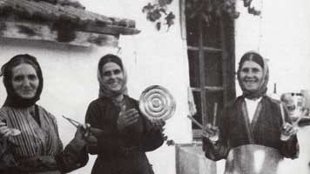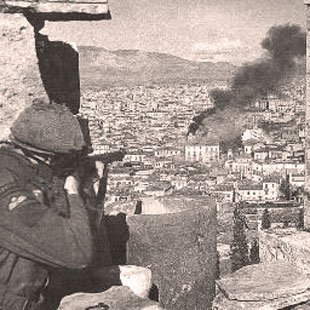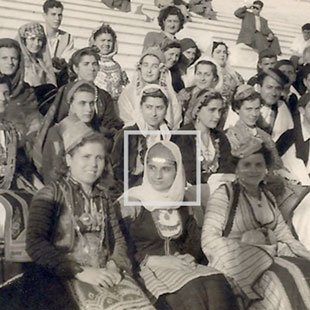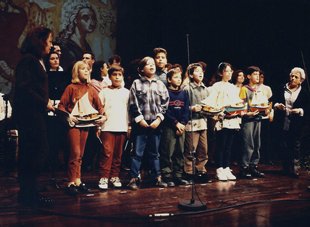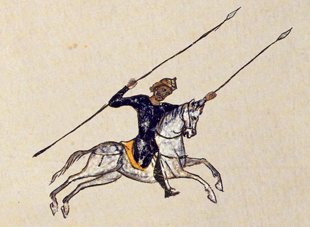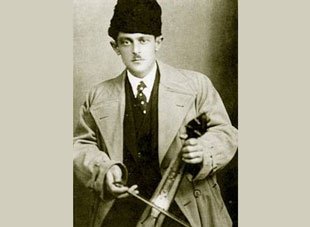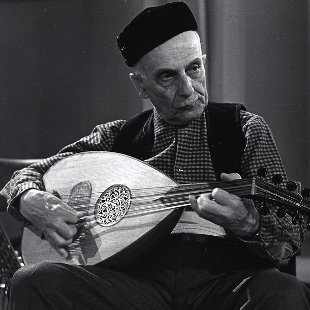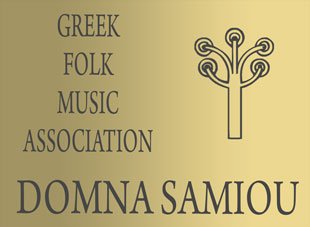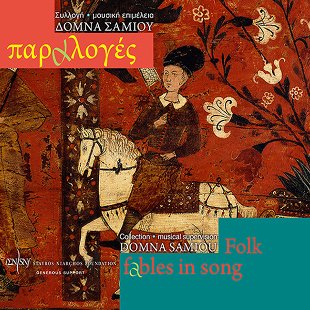You are at: Home page Her Work List of Songs The Dead Brother
Του νεκρού αδελφού
Listen
Lyrics
Mother with the nine sons
aides pouli mou haides, and but one daughter,
you washed her hair, ki aman aman, you washed her hair in the dark.
You washed her hair in the dark
aides pouli mou haides, you brushed it in the moonlight
and often, ki aman aman, and often spoke to her sweetly.
You’d often speak sweetly to her out in the moonlight
and plait her hair in the starlight through till morning.
Matchmakers came from Babylon
who would take virtuous Areti,
take her far away to foreign lands.
And none of her brothers would have it, yet Konstantinos would:
– Mother, let Areti be married abroad
so I will have a place to lay my head upon my travels.
– Konstantis, I thought you wise, though your words are not.
[And if I’m visited by sadness or for joy, who will fetch her then?
– If you’re visited by sadness or for joy, I will fetch her then.
The leap-year came round with its ireful months,
death came a-visiting and took all nine,
Konstantis with them, before he could fulfil his vow.
And their mother was left alone like a reed on the plain,
weeping and lamenting over all their graves,
but at Konstantis’ headstone she dwelt and mourned the most.
– Konstantis, why was all your talk of fetching Areti,
and ne’er one word of embracing death?
Be damned, Konstantis, be thrice-damned
for sending my Areti so far, so far away.
And with all her curses, with all her tears
the earth moved aside and up rose Konstantis.
– Charon, give me three days and three nights
to keep the vow I made my mother.
– And who will guarantee your going and your coming?
– The Holy Virgin, Christ and the Physician Saints.
He turned his grave into a mount, its stone into a halter,
leapt up on the black steed's back and set off for Areti.
He spied her at the dance and reined his stallion in.
– Areti, come here to me, our mother wants you near her.
– Tell me, little brother, what is it she wants from me?
If she's grieving, I'll join her in her grief,
if she's joyful, I'll don my festive clothes.
– No matter, Areti, for better or for worse, come as you are.
He bade his black horse kneel and sat her on its back.
As they rode along, the birds sang, saying:
– Behold a beautiful girl led along by a dead man.
– Do you hear, Konstantinos? What is that the birds are saying?
– Don't mind their talk; they are but birds, and birds will sing.
– Konstantinos, is that incense I can smell upon you?
– When I was blessed just yesterday at Saint John's church,
the priest overfilled his censer just a little.
Further on, more birds piped up and said:
– Almighty God, is it not shameful for a dead man
to lead fair Areti back home in Your sight?
Finally, they drew near the church of the Holy Martyrs.
– Get yourself home, sister, for I shall go and pray.
– Let us go together, Konstantis, your prayers can wait for after.
– You must go home alone, Areti, for I am a dead man.
Her heart broke and to their home she went.
She found the door locked,
the keys gone and the shutters cobwebbed.
– Mother, open up! Open up for your dear Areti.
– Get thee gone, Charon, for I have no Areti.
I had a daughter once called Areti, but who knows where she’s at.
– Here, Mother, look: the ring my husband gave me
when my nine brothers betrothed the two of us.
At the door they embraced,
surrendering their souls in each other’s arms.]
Translated by Michael Eleftheriou
Additional verses are from Μ. Γ. Βαγιανός, Μελί Καραπούρνων-Ερυθραίας Μικράς Ασίας, Meli Megara 1981, pp. 64-65.
Original Lyrics
Του νεκρού αδελφού
Το τραγούδι της Αρετής
Μάνα με τους, μάνα με τους εννιά σου γιους,
άιντες πουλί μου χάιντες, τη μια σου θυγατέρα
την ήλουτζες, κι αμάν αμάν, την ήλουτζες στα σκοτεινά,
την ήλουτζες, την ήλουτζες στα σκοτεινά,
άιντες πουλί μου χάιντες, τη χτένιζες στα φέγγια
τήνε συχνο- κι αμάν αμάν, τήνε συχνοκολάκευγες
τηνε συχνοκολάκευες όξω στα φεγγαράκια,
στ’ άστρι και στον αυγερινό ήπλεκες τα μαλλιά της.
Προξενητάδες ήρτανε απέ τη Βαβυλώνα
να πάρουνε την Αρετή πολύ μακριά στα ξένα.
Κι όλα τ’ αδέρφια δεν ηθέν1 κι ο Κωσταντίνος ήθε.
– Μάνα να την παντρέψουμε την Αρετή στα ξένα
να ’χω κι εγώ αποκούμπηση στα ξένα που γυρίτζω.
– Φρένιμος2 είσαι Κωσταντή μ’ άσχημα λόγια λέγεις.
[Κι αν μού ’ρθει θλίψη ή χαρά ποιος θα μου τηνε φέρει;
– Αν σού ’ρθει θλίψη ή χαρά εγώ θα στηνε φέρω.
Ήρτε ο χρόνος δίσεκτος κι οι μήνες οργκισμένοι
κι ήπεσε το θανατικό κι οι εννιά ’δερφοί πεθάναν.
Επόθανε κι ο Κωσταντής όπου το τάμα είχε.
Κι ήμεινε η μάνα μοναχή, σαν καλαμιά στον κάμπο.
Σ’ όλα τα μνήματα ’κλαιγε σ’ όλα μοιρολογιούνταν.
Στου Κωσταντίνου το μνημνιό ενέσπαν’ τα μαλλιά της.
– Δε μου ’ λεγες βρε Κωσταντή πως ήθε ν’ αποθάνεις,
μόν’ μου ’ λεγες την Αρετή πως ήθε να μου φέρεις.
Ανάθεμά σε Κωσταντή και τρις ανάθεμά σε,
οπού μου την εξόριξες την Αρετή στα ξένα.
Αφ’ την κατάρα την πολλή κι αφ’ το πολύ το κλάμα
η γης αναταράχτηκε κι ο Κωσταντίνος ήβγκε.
– Άφησ’ με, Χάρε, άφησ’ με τρεις μέρες και τρεις νύχτες
να κάμω και της μάνας μου το τάμα που της είχα.
– Και ποιον αφήνεις εγγυητή να πας και να γυρίσεις;
– Την Παναγιά και το Χριστό τους Άγιους Αναργκύρους.
Κάμνει το μνήμα άλογο, την πλάκα συλλιβάρι3,
το μαύρο καβαλίκεψε στην Αρετή να πάει.
Απέ καρσί τη γνάντεψε εις το χορό κι εβάστα.
– Για έλα ’δώ βρε Αρετή κι η μάνα μας σε θέλει.
– Αλίμον’ αδερφάκι μου και τι ’ναι που με θέλει;
Αν είναι θλίψη να θλιφτώ κι αν είν’ χαρά ν’ αλλάξω.
– Καλό, κακό, βρε Αρετή, έλα μ’ αυτά που είσαι.
Το μαύρο του εγονάτισε κι απάνω την επήρε.
Στο δρόμο που πηγαίνανε, στο δρόμο που δγκιαβαίναν
ακούν πουλιά να κελαηδούν, ακούν πουλιά να λένε:
– Για δες κορίτσι όμορφο που σέρνει αποθαμένος.
– Γι’ άκου, γι’ άκου Κωσταντή τι λένε τα πουλάκια.
– Πουλάκια είν’ και κελαηδούν πουλάκια είν’ κι ας λένε.
– Μου φαίνεται βρε Κωσταντή πως λιβανιές μυρίζεις.
– Εχτές προχτές επήγαμε κάτω στον Αϊ-Γιάννη
και θύμιασέ με ο παπάς με περισσό λιβάνι.
Και παρεμπρός που πήγανε κι άλλα πουλιά τους λένε:
– Θεέ μεγαλοδύναμε μεγάλο κρίμα κάμνεις
την Αρετή την όμορφη να σέρν’ αποθαμένος.
Ότι που κοντοκόντεψαν εις τους Αγιούς Μαρτύρους.
– Άμ’ αδερφή στο σπίτι μας να μπω να προσκυνήσω.
– Έλα να πάμε Κωσταντή κι απέ για γύρνα πίσω.
– Άμ’ Αρετή στο σπίτι μας και γω ’μ’ αποθαμένος.
Παίρνει και πα στο σπίτι ντους με μια καρδγκιά καμένη,
γλέπει την πόρτα σφαλιχτή και τα κλειδγκιά παρμένα,
και τα παραθυρόφυλλα που ’ταν αραχνιασμένα.
– Άνοιξε μάνα μ’, άνοιξε κι η Αρετή σου είμαι.
– Άμε Χάρε εις το καλό κι εγώ Αρετή δεν έχω.
Μνιαν Αρετή που ’χα Αρετή, άμε και γύρευγκέ την.
– Να και το δαχτυλίδι μου τ’ αρραβωνιαστικού μου,
οπού μ’ αρραβωνιάσανε και τα εννιά μ’ αδέρφια.
Στην πόρτα αγκαλιαστήκανε, αντάμα ξεψυχήσαν.]
1ηθέν: ήθελαν
2φρένιμος: λογικός
3συλλιβάρι: καπίστρι
Οι στίχοι συμπληρώθηκαν από το Μ. Γ. Βαγιανός, Μελί Καραπούρνων-Ερυθραίας Μικράς Ασίας, Μελί Μεγάρων 1981, σ. 64-65.
Information
- Region: Asia Minor
- Area: Erythraea, Meli
- Categories: Fable Song (Ballad)
- Rhythm: 4 beats
- Duration: 05:35
Collaborators
- Choir: Women's Group from Meli (Megara, Attiki)
Albums
Notes
Also known as the song of Areti, it and Arta’s bridge are the best-loved and most Balkan –or, rather, pan-Balkan– of all the dramatic narrative songs in the folk repertoire. The song draws our attention to the culture shared by peoples separated by such much else. There has been a good deal of academic discussion centring both on the origins of the song and the manifold ideas and mythological elements it contains: the power of an oath, of mourning and of a curse; returning from the dead; the birds that talk; and, above all, perceptions of emigration and life in lands unknown, a concept which is conflated with death– all themes which reflect the shared fate of the peoples who loved the song and sang it. Known, too, in the form of a fairytale, the sung myth has inspired many Greek, Balkan and European writers, confirming the view that it is one of the crowning achievement of the anonymous folk poetry of the region. (See also the song The dead brother (Eastern Romylia)). Miranda Terzopoulou (2008)
Recording information
Domna Samiou taped the first part of this song in Meli, Megara, Attiki, in 1982.
Member Comments
Post a comment
See also

Song
Forty Stonemasons
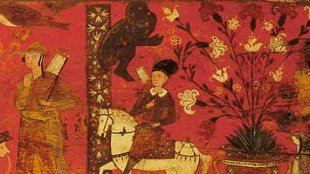
Song
A Little Shorty (Meli, Erythrae)

Song
A Maid from Evripο

Song
A Maid from Vrontados

Song
A Trader Made His Way

Song
A Trader Made His Way

Song
As Long as the Shore

Song
Evyenoula
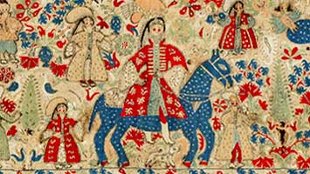
Song
Fair Evgenoula


Song
Giannos and Vangelio

Song
I Passed by and Bade Good Day

Song
Little Apple Tree Perched on the Brink
